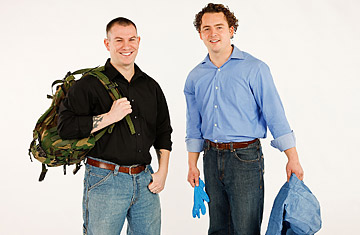
The Marines of Biotrauma Inc. Ben Lichtenwalner, left, and Ryan Sawyer
(2 of 2)
After you recovered these soldiers, what happened next?
We would place the remains in a transfer case, which is sort of like a metal casket, and would drape the flag over it. Then we would load them onto the aircraft for transport. And when we would load them on, we did a little ceremony. The flight crew would be involved, standing in formation on either side of the bay doors, and we would do a little march from our vehicle to the plane and would situate the transfer case into the plane. There's a flag hanging overhead, and it's very solemn and very quiet. There was no audience. This was a ceremony performed by warriors for warriors.
(See a brief history of photographing soldiers' remains.)
When did you and Ryan decide to launch Biotrauma?
My second deployment, the one that Ryan was on, was from February to September '05. We would get to talking with the escorts as they were hanging out in our lobby prior to shipping the remains out. We got to talking with these people and started to notice how emotionally distraught they were when they were connected to such traumatic incidents. And we realized we had the skills to help these people out back home who were going through these types of things, and what came to mind was homicides and suicides. We knew it happened in people's homes, and we sort of figured they were doing this themselves. Eighty percent of these cleanups still, even today, get cleaned up by families themselves. And there's just no reason for it, because what we do is all covered by homeowner's insurance. There's no excuse for anybody to have to do this themselves, especially when it's essentially free to them.
How did the rest of your unit react when they heard about your plan?
A lot of our peers sort of made fun of us. They were cracking jokes. They thought it was lame to be starting a business, but maybe those same guys will be asking us for jobs next month. [Laughs.]
Tell me about your company.
We call what we do "biotrauma remediation." We're providing the remedy for not only the biological hazard but also the trauma that stems from that hazard. Our service is twofold: we do the cleanups, but we also care about the people and try to provide the most sensitive service that we possibly could.
What does the job entail?
We go in and perform the most detailed decontamination we could possibly do. If someone passes away on the carpet, then chances are the blood and body fluids are going to seep out down into the property all the way to the foundation, so you're talking through the carpet, the padding, the floor and whatever else. If that's the case, we've got to go in, get structural cleanup, every last bit of contamination. Then we issue a certificate when we're done so they can have confidence that things were done the right way and perhaps resume living at the residence or have confidence selling it or renting out the room again. That's the physical side, and that has to be done perfectly.
But another thing is that, let's say a mother just had the suicide of her son in the kitchen. If she's cooking a week later and she pulls out a pan from her rack and turns it over and sees a little spot of blood on it, that's such a huge traumatic reminder of what happened. We refuse to let that happen. So what we do is we get lights, we go top to bottom, left to right, like an inch from the wall, just looking over everything. And that's part of the physical side, but it's also the extra step we take to take care of the psychological side. We did a cleanup of a suicide in someone's living room. It was a young kid — he was 18. This was right near Christmas, and there was tissue everywhere from the gun blast. Unfortunately, we had to throw away the tree. Well, one of the things we did, we brought them over a new Christmas tree, and the look on their face after that happened — I mean, obviously, a Christmas tree isn't going to do anything to erase what happened, but just that gesture, to know there was some good in the world out there, even after something like that — it really meant a lot to them.
How has this job changed you?
The samurai had this mentality that you could never really experience life to the fullest unless you lived like you were ready to die at any moment. This field helps solidify the reality that life is finite.
